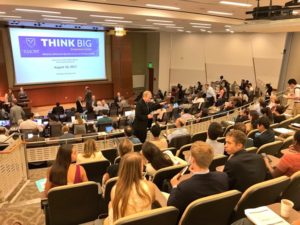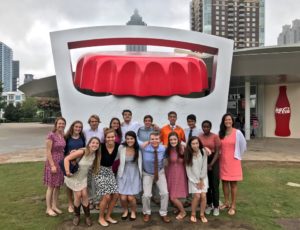Reflections on the morning from Laura Read (GHF 2020).
On Wednesday, it was yet another bright and early start for the fellows, having to be ready in the hotel lobby by 7:00am! We returned to the bagel café and Starbucks for breakfast and were ready to begin the day, boarding the van at 7:15.
Emory University‘s Think Big Symposium: Applying Collaborative Big Data Science for Predictive Health was being held at 8:00am, which we were almost late to thanks to a spot of busy Atlanta traffic. After entering the Rollins School of Public Health, we attended the key note address by Dr. Gary Gibbons, MD. He is the director of the National Heart, Lung, and Blood Institute (NHLBI) at the National Institute of Health. The NHLBI provides global leadership for research, training, and education to promote the prevention of heart, lung, and blood disorders. He also graduated magma cum laude from Harvard Medical School.
The principle topic during the address was the collaboration between numerical data and how to use that for predictive health and medicine. We learned how healthy people are being studied to foreshadow who will become sick in the future. The NHBLI is aiming to train the new generation of leaders in science and improve the health of the nation. We ended up staying for the first speaker of the panel, Arshed Quyyumi, who spoke about cardiovascular health. He linked healthy people’s data to predict if they would develop heart disease. Surprisingly, factors like marriage and place of living had significant impact of the outcomes.
“After a long few hours of lectures, we decided you might want some caffeine… we’re going to the World of Coca Cola!” were the words of Mrs. Hall, a welcome surprise! We drove over to the Coke Museum, where we took photos outside near a giant bottle cap. Albeit being mostly for fun, we linked the trip to global health because Coca Cola is a significant contributor to the diabetes and obesity epidemic. We thought about the controversy if whether or not it’s Cola’s responsibility, or not because they’re a business. We were greeted by a can of coke and smile, followed by a room full of nostalgic Coca Cola memorabilia. Then we were led to the main area, where we could walk around and learn about the company’s history, see how classic Coke is made, and explore Coca Cola in pop culture. Perhaps the most exciting attraction of all was the tasting room, where there were over a hundred flavors from around the world to choose from! There were a few good ones, but many of them tasted funny (see: the neon green soft drink from Djibouti). Our personal favorite was a drink from Italy called Beverly. It was reminiscent of mouthwash and liquid cough medicine. There was a lot of laughing and it was so much fun to hang out with everyone! After a quick round through the gift shop at the end, we headed off to the Mellow Mushroom for a delicious lunch.
Reflections on the second half of the day from Connor Tiffany (GHF 2020).
In the afternoon, we ventured away from the city, and traveled to Yerkes National Primate Research center, a facility dedicated to conducting essential basic science and translational research to advance scientific understanding and to improve human health and wellbeing. With its status as a national personnel records centers, Yerkes is home to more than 3,000 non human primates, including squirrel monkeys, chimpanzees, and sooty mangabeys. On our tour, we spoke with Julie Moran, an assistant field station operation manager, who discussed the animals behavioral patterns, the various forms of research in which they are involved, and how that research is used to better the lives of humans. Despite the rain, we were fortunate to encounter multiple animals, learning of their vibrant personalities and different vocalizations, like blowing raspberries, a chimpanzee’s call which symbolizes trust and affection. I was especially grateful to meet Winston, a chimpanzee who was incredibly amicable, even with his status as the alpha male of his community. In correlation with our summer reading book Spillover, our experience at Yerkes helped us to better understand the phenomenon of zoonosis, an animal infection transmissible to humans, and how our involvement with animals can lead to the deaths of thousands.
Later in the evening, we made plans to dine at the vintage Rí Rá Irish Pub to replenish from our long day of focus. As we walked through the door and waited to be seated, we were surprised to see a cluster of Hollywood cameras and spotlights illuminating the interior of the historic restaurant. After eating dinner and learning that the fellows could possibly be featured on an episode of “Date Night Live”, everyone gathered around a hotel television and watched the cringe worthy episode unfold. To end the day, the senior fellows lead a productive discussion about “Spillover” and how it applies to the future of disease control.

